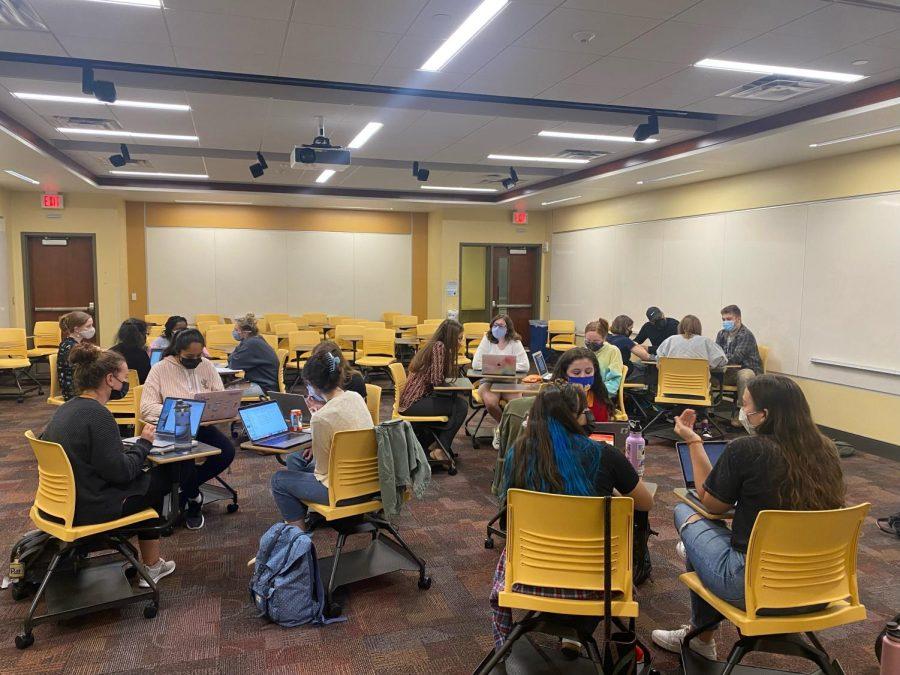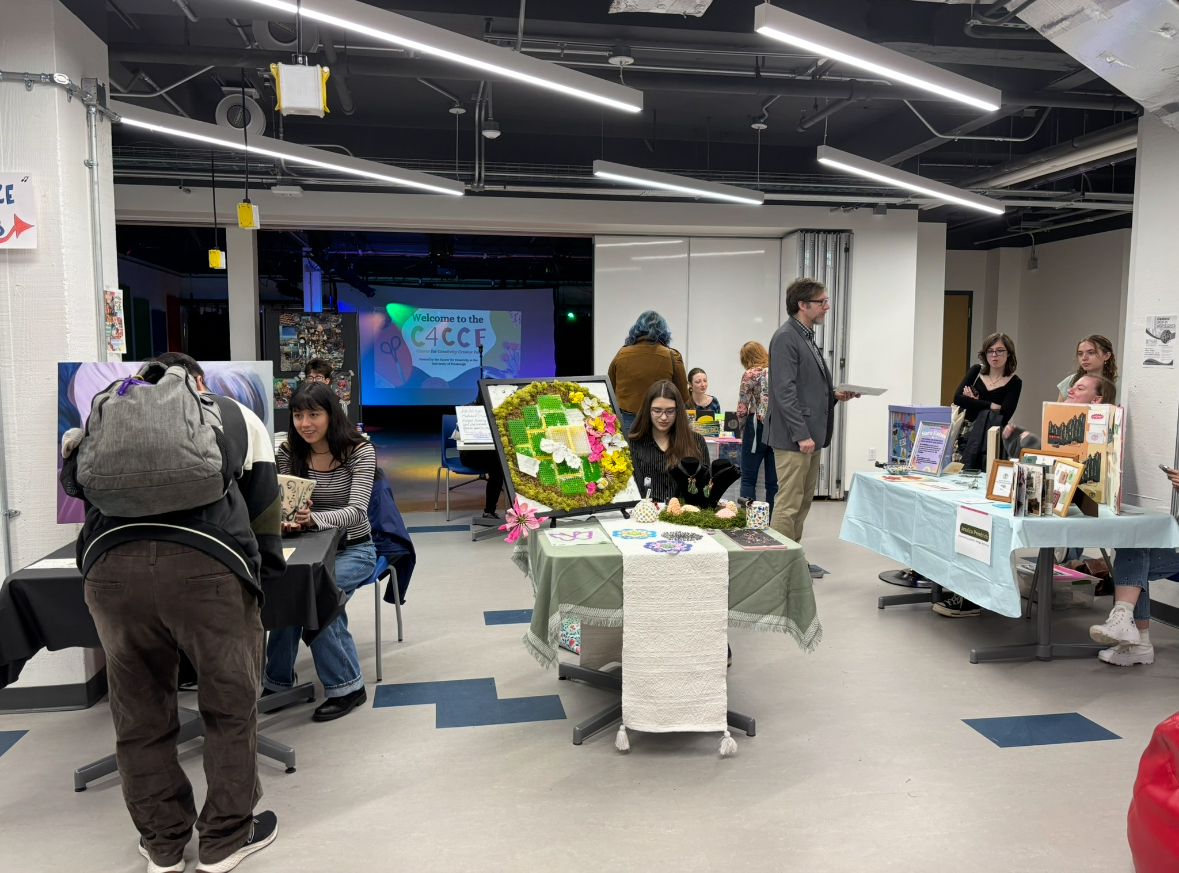‘Anything is a step forward’: Student organization investigates cold cases
Image courtesy of Shannon Stall
SCCC club members meet in Posvar Hall in fall 2021.
March 21, 2022
The body of Jessica Freeman, a 15-year-old victim of sex trafficking, was found on the side of a road in nearby Bethel Park in 1992. The Freeman case, along with countless others, remains unsolved to this day.
A Pitt club, Students Conquering Cold Cases, investigates unsolved cases from the greater Pittsburgh area, such as the Freeman case. Founded in 2015 by then-student Nicole Coons, the club provides students an opportunity to get hands-on experience with investigating authentic case files. The current group of 21 members meets weekly and works to establish some kind of resolution to the cold cases provided by local law enforcement.
The group has been investigating the Freeman case for three years now. Shannon Stall, the SCCC president and a senior psychology major, said the club has worked directly with Freeman’s family and the law enforcement officers associated with the case in order to gain an intimate understanding of her life and circumstances leading up to her death.
While Freeman being so young made the work especially difficult, according to Stall this motivates the club to put such a significant amount of time and energy into helping to move the case forward.
“We’re going to continue to do anything we can to try to save that innocence, that she was still a child and didn’t deserve to die,” Stall said.
Stall said working with victims’ families is a tangible way they are able to provide assistance with their loved one’s unsolved cases. The club takes time to speak directly with family members in an attempt to better understand the lives of victims. This has led to a higher level of understanding and empathy for the victims and provides information often unavailable in a case file. According to Stall, this can go a long way towards humanizing a victim and combatting biases that could grow out of the particulars of a case.
Sami Kuperberg, SCCC’s communications liaison and a junior sociology and history major, said knowing that the club is working can provide some comfort to victims’ families and helps motivate her and fellow members to put time and effort into investigating.
“A lot of these victims’ families feel like [these cases] will never be solved,” Kuperberg said. “Even the potential of helping a victim’s family find closure is an incredible experience and project to be a part of.”
The club’s newest case, according to Stall, is an investigation into another local death. Faye Jackson, a 24-year-old sex worker, was found dismembered in nearby Turtle Creek in 1994. Stall said the club is currently working through the case file to establish a workable timeline for the case.
During this phase, members work in groups to break down files and extract names, dates and major events, before compiling the information into a single format to allow for digital manipulation. The club uses this data to create a detailed timeline of events, which they are then able to plot into Google Maps.
According to Stall, the map allows the club to manipulate drive times and terrain access, check into suspect interview inconsistencies and more in ways that were otherwise difficult without the digitization of information. Consolidating hundreds of pages of handwritten or typewriter-printed information into a digital format allows for a significantly more thorough investigation, and is something that the club’s law enforcement partners specifically asked for and appreciated.
Samantha Wert, the club’s case manager and a junior psychology and law, criminal justice and society major, said getting to work with real case files provides an unrivaled level of legitimacy to their work.
“The authenticity of it makes it so much more real. You can really understand the fact that this is a real person’s life,” Wert said. “It’s not just a documentary, it’s not just a story to tell someone. It has effects that are way wider than anyone could know.”
The authenticity brings with it a level of difficulty that the group remains aware of. According to Stall, she does her best to present every new member with an expressed understanding that their goal is to move cases forward in any way possible. Stall said one of the main ways the club provides assistance is by working to get the mountain of untested evidence processed, which could be crucial in connecting missing pieces in a case.
“While we have DNA from 30 years ago, we would love to retest them, so funding would definitely be a great thing for us to have,” Stall said.
Allegheny County has a designated crime lab tasked with processing evidence for its caseload. According to Stall, the backlog means cold cases often aren’t prioritized and can force any processing necessary to be outsourced to private labs, which typically comes with a substantial price tag. While the county has ways of securing funding for this, the group feels a sense of responsibility to facilitate getting as much of the viable evidence processed as possible.
Stall said getting funding is extremely difficult as a small club, especially in the face of this high cost. The club tries to generate the necessary money through various means to get these DNA tests, which could provide a crucial step toward closing a case.
The club’s efforts don’t go unnoticed by their law enforcement partners. According to Stall, county detectives are incredibly receptive and welcome all the work that SCCC puts in. The club’s efforts help supplement law enforcement and create a “symbiotic relationship” between the two.
According to Kuperberg, the group’s significant level of engagement with local law enforcement keeps her and the rest of the group engaged, even in the face of roadblocks like a lack of funding. Kuperberg said having access to, and the support of, detectives from local police departments provides a confidence boost that motivates members to keep working.
“It has been an incredible experience sitting in a room and sharing your theories and having a detective take notes,” Kuperberg said. “Having such a strong collaborative relationship with law enforcement is also pushing us. It’s definitely encouraging that your ideas are being validated.”
But according to Wert, this opportunity does not overshadow the reality that these cases have gone unsolved for a reason. Wert said while working with law enforcement adds to the experience, it also acts as a consistent reminder that the club’s work is a difficult and often unrewarding effort. She said gaining experience in the field is an important factor to her and other members.
“We are there for the little steps, not just the big cracks in the case,” Wert said. “Anything is a step forward.”
According to Stall, regardless of the product, it is the journey towards progress that makes SCCC such a vital resource to those who may no longer have a voice. Stall knows the work that she and her fellow members do gives the families of the victims a sense that someone is working to provide justice for their loved ones.
“At the end of the day, it’s all about the victims and the victims’ families,” Stall said. “I know we make an impact.”



